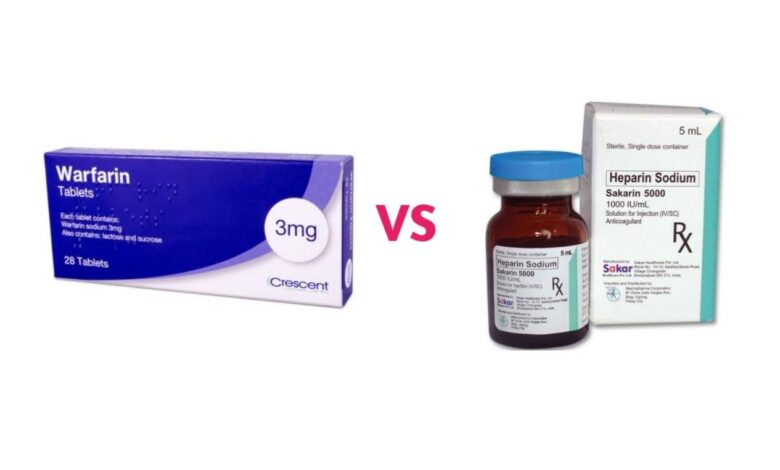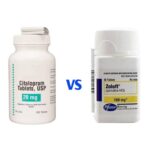Heparin Vs Warfarin: Similarities, Differences, Which works Faster

What are blood thinners?
Blood thinners also known as anticoagulants are medications taken orally or intravenously (through a vein) to help prevent blood clots. They’re given to people at a high risk of getting clots, to reduce their chances of developing serious conditions such as strokes and heart attacks.
A blood clot is a seal created by the blood to stop bleeding from wounds. While they’re useful in stopping bleeding, they can block blood vessels and stop blood from flowing to organs such as the brain, heart, or lungs if they form in the wrong place.
About 2 million to 3 million people take blood thinners every year. You may need them if you’ve already had a heart attack or a stroke since they can lower your risk of having a second one.
What Are Warfarin and Heparin?
Both are “blood thinners,” that help stop your blood from thickening (clotting.) Natural clots help seal wounds on the inside and outside of your body. But unnecessary clots can cause problems. This is especially true when they form inside veins in your leg (deep vein thrombosis) or travel to:
- Your brain, which can cause a stroke
- Your heart, which may lead to cardiac arrest
- Your lungs, where a pulmonary embolism can form
Blood thinners don’t really thin your blood. They just interrupt your body’s natural clotting process. Warfarin and heparin act on different parts of this process.
How Do Warfarin and Heparin Work?
Warfarin, also known by the brand name Coumadin, is a vitamin K antagonist. That means it works to stop your liver from processing vitamin K into substances, or “factors,” that normally help clot your blood.
You get vitamin K from eating green leafy vegetables like broccoli, kale, Brussels sprouts, and spinach. Bacteria in your gut also produce it naturally.
Heparin drugs interfere with certain factors that activate thrombin, an enzyme that helps your blood clot. That means your blood clots less easily.
How Do You Take Warfarin and Heparin?
Warfarin: Doctors usually prescribe warfarin as a daily pill. Your dosage is based on the results of a blood test called a prothrombin time (PT) test. You may also hear this called international normalized ratio (INR) testing because that ratio is the standard way the test results are reported.
The test tracks how quickly your blood clots. Your doctor will give you this test every few weeks and adjust your dose as needed.
Heparin: Heparin is taken as a shot. You get the type called unfractionated heparin (UFH) through an IV, usually in a hospital. The more you weigh, the more your doctor will give you. The hospital staff will check your blood regularly to make sure your dosage is correct.
You can inject low molecular weight heparin (LMWH) into your skin at home. You might know these drugs as dalteparin (Fragmin) or enoxaparin. As with UFH, your dose is based on your weight. These drugs work in a similar way to UFH. But they’re more stable and don’t require hospital staff to monitor you.
Similarities and differences between heparin and warfarin
- Heparin and warfarin are both used as anticoagulants, in order to decrease the development of blood clots.
- Heparin is a direct anticoagulant. It is a mixture of high molecular weight sulfated mucopolysaccharides.
- Warfarin is an indirect anticoagulant. It is an organic compound (4-hydroxycoumarins).
- The low dose of both anticoagulants can cause thrombosis, while overdose causes hemorrhages.
- Heparin prevents the correct work of fibrin and thrombin, while warfarin prevents the correct work of vitamin K.
- Heparin is given as an injection, while warfarin is used in tablet form.
Because of its large molecule, heparin does not cross the placental barrier and is not excreted in breast milk, making it effective and safe for use during pregnancy and during lactation. Warfarin penetrates into the breast milk and passes through the placental barrier, causing a characteristic dysmorphism.
Heparin vs warfarin which works faster?
Studies indicate that heparin works faster or quicker than warfarin, so it is usually given in situations where an immediate effect is desired. For example, this medication is often given in hospitals to prevent the growth of a previously detected blood clot. The clinical effect of warfarin occurs after 12 to 72 hours. It is recommended for long-term therapy.
Why is heparin given before warfarin?
Heparin is given before warfarin because of the need to prevent blood clots on time. Warfarin works by slowing down the process in the liver that uses vitamin K to make certain proteins (clotting factors) that cause clotting. Because it may take several days before warfarin becomes completely effective, heparin is given until the warfarin effect can begin.





